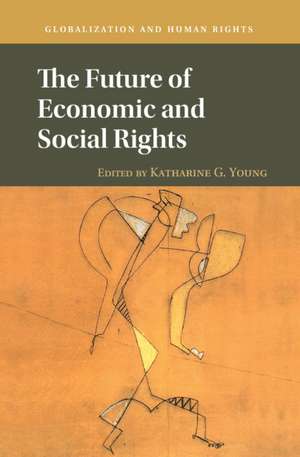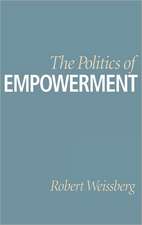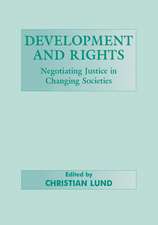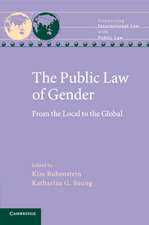The Future of Economic and Social Rights: Globalization and Human Rights
Editat de Katharine G. Young Cuvânt înainte de Amartya Senen Limba Engleză Hardback – 10 apr 2019
Preț: 1306.79 lei
Preț vechi: 1306.79 lei
-NaN% Nou
Puncte Express: 1960
Preț estimativ în valută:
250.05€ • 261.07$ • 206.95£
250.05€ • 261.07$ • 206.95£
Carte tipărită la comandă
Livrare economică 05-19 aprilie
Preluare comenzi: 021 569.72.76
Specificații
ISBN-13: 9781108418133
ISBN-10: 1108418139
Pagini: 706
Ilustrații: 12 b/w illus. 6 tables
Dimensiuni: 156 x 234 x 41 mm
Greutate: 1.11 kg
Editura: Cambridge University Press
Colecția Cambridge University Press
Seria Globalization and Human Rights
Locul publicării:New York, United States
ISBN-10: 1108418139
Pagini: 706
Ilustrații: 12 b/w illus. 6 tables
Dimensiuni: 156 x 234 x 41 mm
Greutate: 1.11 kg
Editura: Cambridge University Press
Colecția Cambridge University Press
Seria Globalization and Human Rights
Locul publicării:New York, United States
Cuprins
Foreword Amartya Sen; 1. Introduction Katharine G. Young; Part I. Adjudication and Rights: Global Trends: 2. Justiciable and aspirational ESRs in national constitutions Evan Rosevear, Ran Hirschl and Courtney Jung; 3. Judicial politics and social rights Malcolm Langford; 4. Constitutional non-transformation? Socioeconomic rights beyond the poor David Landau and Rosalind Dixon; Part II. Adjudication and Rights in Context: Two Contrasts: 5. The Right to Education in the American State Courts Michael A. Rebell; 6. Legislating human rights – experience of the right to Education Act in India Arghya Sengupta, Ajey Sangai, Shruti Ambast and Akriti Gaur; Part III. Adjudication and Rights: Democracy and Courts: 7. The participatory democratic turn in South Africa's social rights jurisprudence Sandra Liebenberg; 8. Why do we care about dialogue? 'Notwithstanding clause', 'meaningful engagement' and public hearings: a sympathetic but critical analysis Roberto Gargarella; 9. Empowered participatory jurisprudence: experimentation, deliberation and norms in socioeconomic rights adjudication César Rodríguez-Garavito; 10. Courts and economic and social rights/ courts as economic and social rights Judith Resnik; Part IV. Economic and Social Rights in Retrenchment: Past and Future: 11. The future of social rights: social rights as capstone Jeff King; 12. The present limits and future potential of European social constitutionalism Colm O'Cinneide; 13. Canada's confounding experience with health rights litigation and the search for a silver lining Colleen M. Flood, Bryan Thomas and David Rodriguez; 14. Universal basic income as a social rights-based antidote to growing economic insecurity Philip Alston; Part V. Economic and Social Rights in Development: Local and Global Trajectories: 15. Rights as logistics: notes on the right to food and food retail liberalization in India Amy J. Cohen and Jason Jackson; 16. Human rights, investment and the rights-ification of development: the practice of 'human rights impact assessments' in large-scale foreign investments in natural resources Jeremy Perelman; 17. Human rights testimony in a different pitch: speaking political power Lucie White; 18. Grassroots lawfare: how South Africa's urban poor use land as a legal instrument Kerry Ryan Chance; Part VI. Rights and Accountability: Emerging Doctrines, Evolving Concepts: 19. Public budget analysis for the realization of economic, social and cultural rights: conceptual framework and practical implementation Olivier De Schutter; 20. Bridging the gap: the evolving doctrine on ESCR and 'maximum available resources Rodrigo Uprimny, Sergio Chaparro and Andrés Castro Araújo; 21. Waiting for rights: progressive realization and lost time Katharine G. Young.
Recenzii
'In a fast-growing area, Katharine G. Young stays at the forefront. She is sure-footed, rigorous and empathetic.' Albie Sachs, former Justice of the Constitutional Court of South Africa
'Methodologically pluralist and ranging widely over the world, these interdisciplinary essays [do much more than survey the existing state of knowledge about social and economic rights. They] define important lines of inquiry for future scholarship. All scholars interested in the field, whatever their discipline, will find much here to help them understand the field and move knowledge forward.' Mark Tushnet, William Nelson Cromwell Professor of Law, Harvard University, Massachusetts
'Katharine G. Young's impressive collection is an indispensable resource [for anyone working on or with economic and social rights]. Many of the leading voices in the field have contributed their recent findings and insights. Disregarding the fashionable disenchantment with human rights, these chapters analyse and firmly establish the role of rights as instruments of social justice. Spanning four continents and combining multiple scholarly methods and perspectives, this book may not literally predict the future, but it is undoubtedly able to inspire it.' Eva Brems, Universiteit Gent
'Economic and social rights are the future, whether through their realization, contributing to political stability and distributive justice, or through their denial, creating the space for individual and collective disempowerment, rising inequalities, political unrest and social conflict. The thought-provoking perspectives of the contributors to this book offer a nuanced understanding of both possibilities and of what lies in between.' Virgínia Brás Gomes, Chair of the UN Committee on Economic, Social and Cultural Rights
'Methodologically pluralist and ranging widely over the world, these interdisciplinary essays [do much more than survey the existing state of knowledge about social and economic rights. They] define important lines of inquiry for future scholarship. All scholars interested in the field, whatever their discipline, will find much here to help them understand the field and move knowledge forward.' Mark Tushnet, William Nelson Cromwell Professor of Law, Harvard University, Massachusetts
'Katharine G. Young's impressive collection is an indispensable resource [for anyone working on or with economic and social rights]. Many of the leading voices in the field have contributed their recent findings and insights. Disregarding the fashionable disenchantment with human rights, these chapters analyse and firmly establish the role of rights as instruments of social justice. Spanning four continents and combining multiple scholarly methods and perspectives, this book may not literally predict the future, but it is undoubtedly able to inspire it.' Eva Brems, Universiteit Gent
'Economic and social rights are the future, whether through their realization, contributing to political stability and distributive justice, or through their denial, creating the space for individual and collective disempowerment, rising inequalities, political unrest and social conflict. The thought-provoking perspectives of the contributors to this book offer a nuanced understanding of both possibilities and of what lies in between.' Virgínia Brás Gomes, Chair of the UN Committee on Economic, Social and Cultural Rights
Descriere
Captures significant transformations in the theory and practice of economic and social rights in constitutional and human rights law.



























